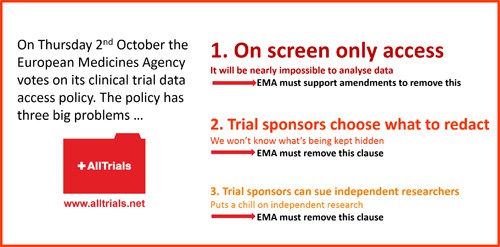
The European Medicines Agency (EMA) published its new policy on publishing clinical trial results this week amid a flurry of pressure from transparency advocates.
The agency said its new policy would apply to all centralised marketing authorisation applications submitted as of January 1, adding that clinical study reports (CSRs) will be released as soon as a decision on the filing is made.
The first phase of the initiative will only make CSRs available, with access to anonymised, patient-level data coming after a consultation period to “address the various legal and technical issues linked with the access to patient data.”
The EMA also suggested the policy will serve as a “complementary tool” ahead of the implementation of EU transparency rules for clinical trials that are not scheduled to come into effect before May 2016.
It will apply to new medicines from the start of next year and be expanded to line extensions for existing product from July 1 2015, said the agency.
EMA executive director Guido Rasi said the new policy “sets a new standard for transparency in public health and pharmaceutical research and development” but transparency groups – which mounted a Twitter campaign to try to influence yesterday’s vote – said two out of three major concerns remain unaddressed.

The AllTrials campaign welcomed the decision to scrap restrictions on accessing CSRs by researchers – an earlier policy draft had suggested these would only be available on screen and not able to be saved or printed – but said other parts of the policy remain a concern for researchers.
A particular sticking point is that the responsibility for redacting information in reports is in the hands of trial sponsors, which means they “get to suggest which information submitted to the EMA should be kept hidden,” it said. Deciding what is commercially confidential information – and so can be redacted – remains a grey area.
Meanwhile, trial sponsors can take direct legal action against researchers if they believe the Terms of Use clauses in contracts are breached, making individual scientists “vulnerable to protracted legal battles with large companies which will introduce a new and unpredictable risk of high legal costs into routine academic work,” said AllTrials.
“It is still the case that trial sponsors might be able to cut out any information they don’t want others to see,” commented Tracey Brown, managing director of Sense About Science, a charity that tries to encourage an evidence-based approach to scientific and technological developments.
“Companies and other bodies that have embraced an open approach to their trials have made it clear that the need for redaction is very limited,” she added.
Meanwhile, Ben Goldacre, author of Bad Pharma, also raised concerns about the redactions process, noting that EMA reached an agreement this year with AbbVie to “censor information on protocol changes from the public release of a CSR”.
“Protocol changes in a trial are precisely the kind of information that researchers need to make an informed decision about whether that trial was a ‘fair test’ of the treatment,” he said.
“It is hard to see how it is justifiable to hide protocol changes, in a trial from eight years ago, on over-riding grounds of commercial confidentiality.”
The EMA insists that there will only be “limited instances” in which redactions will be proposed on commercial grounds and the decision on redactions will lie with the agency.
The new policy will also increase trust in its regulatory work by permitting the public “to better understand the agency’s decision-making processes, whilst allowing researchers to re-assess data sets will help “avoid duplication of clinical trials, foster innovation and encourage development of new medicines.”
EU consumer organisation the BEUC said the policy should further boost trials transparency if it is implemented by regulatory authorities in EU member states, but it warned that the guidelines “are not set in stone and might face further undermining.”
In particular, it suggested that legal challenges such as those mounted by AbbVie and InterMune could happen again, while ongoing discussions on commercial confidentiality in the context of the Transatlantic Trade Investment Partnership (TTIP) could also lead to a reversal.
The planned transfer of pharma policy from the European Commission’s health affairs directorate to industry also “augurs badly”, it said.




